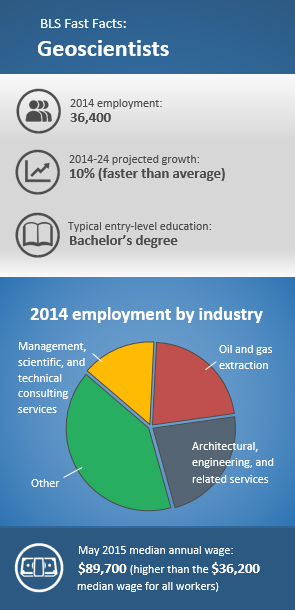All Categories
Featured
Table of Contents
Geophysicist in Parkwood Western Australia 2023

Other possible geophysicist majors that aren't geophysics or geoscience consist of: Atmospheric sciences and meteorology Chemical and physical oceanography Earth science Environmental science Hydrology and water resources science Products science By making any geophysicist degree, and by taking the necessary geology courses, you need to certify for an entry-level position as a geoscientist or geophysicist.
Eventually, trainees need to learn: a branch of geology that takes a look at the different aspects of minerals, consisting of chemical composition, internal crystal structure, and physical homes. the research study of rocks and the procedures and conditions that form and transform them in time. There are a couple of neighborhoods in this branch of geology, consisting of igneous, metamorphic, and sedimentary rocks.

This field examines structural rock functions such as cleavage, faults, joints, and little folds. They should also discover the computer system skills required to: evaluate data develop digital designs and maps operate geoscientists' software Trainees need to likewise make the most of all opportunities to acquire real-world experience. Hopeful geophysicists ought to anticipate to spend time learning: in the classroom in the field in labs Clearly, skills taught in the classroom are extremely essential for aiming geophysicists.
Geophysical Surveys For Planning & More in Perth WA 2022
For instance, geoscientists invest a lot of their time outside when operating in the field, so they must have "outside abilities" like camping and running boats, airplane, and other vehicles. Because they invest so much time in remote areas, it's essential that geophysicists also have the physical endurance to carry needed devices on their walkings to areas of research study.
The task offers: a high mean and leading revenues a high rate of personal satisfaction among geophysicists low work tension favorable job outlook More details on incomes capacity and job outlook is detailed below. For students looking to land an entry-level function as a geoscientist or geophysicist, it takes four years, or the time needed to complete a bachelor's degree in geophysics or a related discipline.
Some research positions in geophysics require postgraduate degrees. Likewise, if you plan to teach at a college or university, you need to earn a Ph - Exploration Geophysicist: Occupations In Alberta in Bellevue WA 2022. D. in geophysics or a related field. The time it takes to earn a Ph. D. varies by institution and program, however it usually takes 4 to six years beyond the bachelor's degree.
Geophysical Survey In Archaeology in Hillarys WA 2023
In truth, the majority of companies need prospects to have a bachelor's degree in geophysics or a closely associated discipline for all entry-level positions. And, sometimes, employers need a master's degree. As an outcome, there's no other way around the degree requirements for ending up being a geophysicist. A lot of employers will expect or need a practicing geologist to be certified for positions beyond those at the entry level.
Currently, 31 states require licensing for geologists, although licensing is not always required, specifically for entry-level work. The states that do problem licenses use the Basics of Geology Test (FGE), which is administered through the National Association of State Boards of Geology (ASBOG). Now that you know which degree for geophysicist jobs you need, you'll require to land a job, and it is necessary to learn just how much cash you can make in this profession.
According to BLS, the typical annual wage for geoscientists is $93,580. The most affordable 10% of earners earn less than $52,000, while the greatest 10% earn more than $201,000 every year. Salaries vary by market type and geographic area. According to BLS, certain industries offer greater incomes for geoscientists, and in some cases, they provide higher-than-average incomes.
What's The Difference Between A Geotechnical And ... in Salter Point Australia 2023
Mining, quarrying, and oil and gas extraction offers over $32,000 more each year than the average yearly wage for this profession. The federal government, too, provides over $10,000 more in incomes than the national average for geoscientists. In addition to industry type, geographic area can considerably impact revenues for this profession.

The top-paying states and their yearly mean incomes, according to the BLS, include: Texas $166,720 Oklahoma $149,630 Pennsylvania $120,590 Hawaii $120,130 Colorado $107,260 These five top-paying states offer much higher earnings than the average for this profession. Wages for geoscientists in Texas are over $73,000 greater than the national average.
It should come as not a surprise that the majority of these high-paying areas remain in Texas and Oklahoma, however some are found in California, Louisiana, and Colorado. The leading 10 highest-paying city locations for geoscientists are: Houston-The Woodlands-Sugar Land, Texas: $188,400 Tulsa, Oklahoma: $186,490 Midland, Texas: $167,040 Odessa, Texas: $147,080 Oklahoma City, Oklahoma: $145,350 Bakersfield, California: $130,080 Urban Honolulu, Hawaii: $124,470 New Orleans-Metairie, Louisiana: $121,030 Washington-Arlington-Alexandria, DC, VA, MD, WV: $120,180 Denver-Aurora-Lakewood, Colorado: $116,910 For some geoscientists and geophysicists, living in a metro city is not as appealing as residing in a smaller sized neighborhood.
Table of Contents
Latest Posts
How To Become A Geologist Or Geophysicist in Ardross Aus 2023
Archaeological Geophysics And Geochemistry Planning A Geophysical Survey: Environmental & Physical ... in Applecross Aus 2022
Why Study Geophysics? in Mundijong WA 2022
More
Latest Posts
How To Become A Geologist Or Geophysicist in Ardross Aus 2023
Archaeological Geophysics And Geochemistry Planning A Geophysical Survey: Environmental & Physical ... in Applecross Aus 2022
Why Study Geophysics? in Mundijong WA 2022